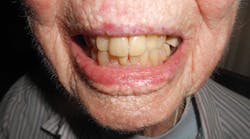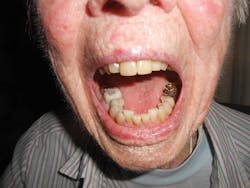Living to 100: Data about centenarians provide valuable oral health information
Your patient today is Verrill, who just celebrated her 100th birthday. She is in for a six-month appointment. She states that she wants to ensure that she is using the proper techniques for brushing and flossing, so that she can maintain her teeth for the rest of her life (see Figures 1 and 2).
Your immediate reaction is a surge of curiosity regarding her lifestyle and her health habits. What is she doing to maintain her health at 100 years old?
During an interview with Carol Perkins, RDH, Verrill answered some lifestyle questions, and some were related to her dental health. The interview questions are listed below, and followed by some common facts and current findings related to centenarians.
What type of work did you do?
She worked as an x-ray technician in the San Francisco Bay area. She worked for a medical doctor and took radiographs of the entire body. While working in the radiology field of medicine, Verrill wore a dosimetry device and never received any radiation exposure that was of concern.
What family members do you have?
Verrill did not marry or have children. She had two brothers and one sister and says, "They are all gone now." Her brothers had children, and one nephew lives nearby. Both of her parents died in their 80s.
What have you done to maintain your health?
Verrill was an active swimmer until she suffered a shoulder injury and a rotator cuff injury that limited her swimming. She has been active in a hiking club for years and was given a recent award for her years as a member. She said that she hiked four to five miles several times a week. At this point, she walks around a 9-hole golf course for exercise. Interestingly, Verrill still drives and goes to a local Trader Joe's for her vegetables and also to the grocery store to buy her favorite foods.
What has your diet been throughout your life?
During the Great Depression, food was scarce (she was age 16 in 1932). She remembers her dad fishing and getting silver salmon every day and that is what they survived on. They grew their own potatoes and planted vegetables and her mother would can food. The Great Depression ended in 1939 when she was 23 years old.
Do you have any periodontal issues?
Verrill said she did not.
What is your dental history?
Verrill had no dental visits as a child that she remembers. She is old enough to remember the belt-driven handpieces that were used many years ago. Currently, she uses a manual toothbrush three times a day and has regular maintenance appointments every six months.
What is your advice in living to be 100?
"Get out of the rocking chair." "Walk and swim." "Eat what you want. Have one glass of wine at dinner and, if you have company, then have two glasses of wine."
Common factors
Centenarians are the fastest growing age segment of the population today. More than 72,000 centenarians currently live in the United States. Worldwide, they comprise 450,000 in number. However, some centenarians are probably not even included in these statistics when found in remote areas.
Those 90-year-olds and older are the fastest growing segment in the United Kingdom as well. The office of National Statistics has documented an increase of 90% since 1911.
If trends continue at the current rate, the United States could have 500,000 centenarians by 2055. Other world areas such as Japan, France, Costa Rica, Italy, Nicoya Peninsula, and Spain are experiencing similar rises in centenarians. Experts believe that we can expect that some individuals already born will exceed 125 years old. Those individuals who are over 110 years of age are termed "super centenarians." Areas long known for their increased life spans are Sardinia, Okinawa, the country of Georgia, and Loma Linda, California.
These areas have been studied for many years with researchers documenting some commonalities of lifestyle factors related to the long lives of these individuals.
There are also some key psychological and social aspects that have been reported that appear to be very important. Optimism, a sense of humor, a passionate commitment, engagement, and an ability to cope with loss are believed to be prevalent in this age group. Several long-term studies have elaborated on these characteristics. The Boston Centenarian Study collects data from a group of patients in the Northeast, and the Okinawa Study has documented many interesting facts about a group of long-lived individuals in Japan.
More by Nancy Burkhart
Do you have a patchy understanding of leukoplakia?
The tongue: A window to other organs
As we learn more about the lifestyle and health habits of these groups, we realize how much diet, exercise, and attitudinal characteristics are factors in maintaining long-term health. Coping skills have been found to be a prime factor with regard to the long lives of centenarians. When you stop and think about this factor alone, these individuals have seen everyone they have known die. They have lost children, parents, siblings, and best friends. However, they still maintain a great attitude and are able to carry on with their daily lives. In a 100+ life span, they have encountered more loss than the average individual. There has been a sharp decrease in the deaths of centenarians between 2000 and 2014. It is speculated that many patients who suffered with diseases that once caused deaths have seen improvements in treatments for pneumonia, heart disease, stroke, and flu.
Oral medicine perspectives
It is known that many centenarians have long-lived children and siblings, and perhaps their parents were long-lived as well. We continue to learn more about this population. As more medications arrive on the pharmaceutical markets, some side effects occur on the oral tissues, such as xerostomia. Specific solutions addressing xerostomia and medication side effects for this group of patients will continue to be a focus.
Interestingly, the information about centenarians supports a well-known fact that a healthy mouth is associated with a healthy body. There is a fact that is seen over and over in the literature on aging: "The healthier you are, the healthier you have been." The more we learn from this group of patients, the better we are able to establish specific guidelines for total health in general. One study (Kaufman et al. 2014) concluded that centenarians and their offspring have better oral health than their respective birth cohorts.
The authors concluded that oral health may prove to be a helpful marker for systemic health and healthy aging. With centenarians being the fastest growing segment of our population, the need for specific oral-health education appears to be a significant consideration for the dental community. The retention of teeth and maintenance of oral tissue is of prime importance to the total health of these dental patients. The expense of dental care could be substantial with an increasing and aging population. The focus on retention of teeth and increasing periodontal health will also assist in lowering dental costs long-term.
As always, continue to ask good questions and always listen to your patients.
Originally published in 2016 and updated regularly.








